Is Everything Everywhere All At Once the greatest movie ever made?
Genre: Drama/Action/Sci-Fi
Premise: While being audited by the IRS at their offices, a laundry store owner is forced to access the multi-verse to save her broken family.
About: After the Daniels made Swiss Army Man, everybody wanted them, including Marvel. The Daniels don’t do anything, however, unless they can do everything. And Marvel’s offer came with those Marvel handcuffs. So after rebuffing Marvel, they finally put this movie together, getting A24 to finance it. Testing just how inclusive New Hollywood is, the Daniels made a 60 year old Asian woman their lead character. The film has been doing better than any indie film over the last three pandemic-infused years, taking in nearly 20 million dollars at the box office. It currently holds a near-impossible 8.9 IMDB rating (for reference, the universally loved Spider Man No Way Home holds an 8.4 and Oscar-winning Coda holds an 8.0).
Writers: The Daniels
Details: 2 hours and 30 minutes
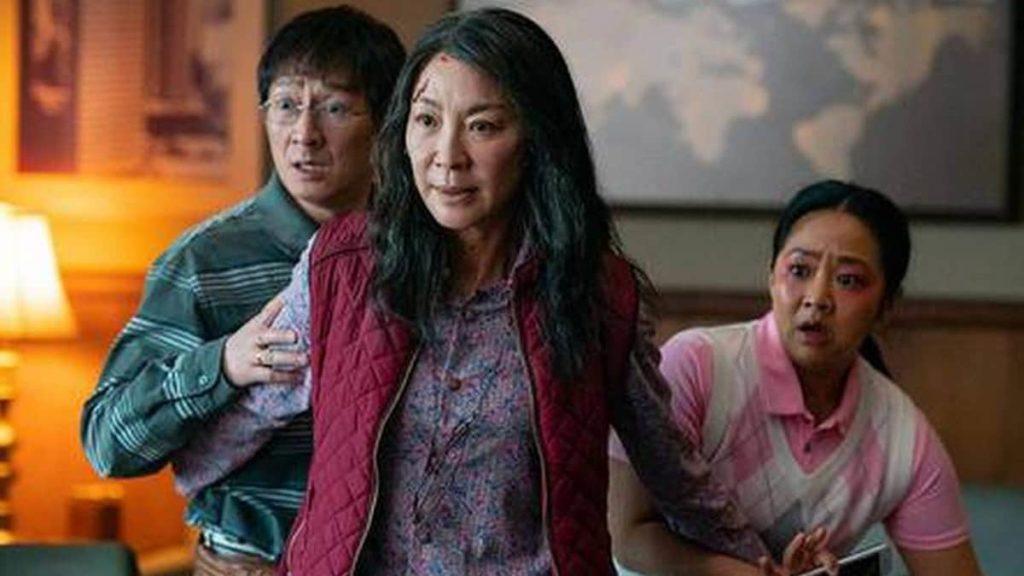
This movie is so weird.
And so cool.
And so unique.
And makes you feel so many things.
Even if you go beyond the story itself, there are crazy things to talk about in this movie.
As I was watching it, I kept having these, “wait a minute” moments. “Wait a minute, is that Jamie Lee Curtis?” “Wait a minute, is that the kid from Indiana Jones and the Temple of Doom?? In a co-starring role???” “Wait a minute, is Jenny Slate really in a fight scene where she’s using her dog on a leash as nunchucks?”
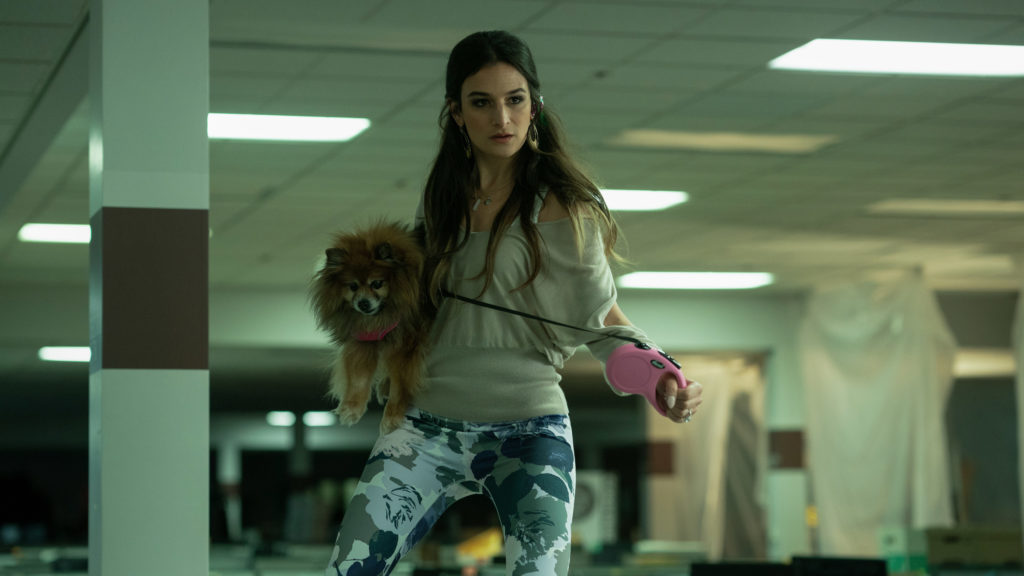
For those who don’t know anything about this movie, it’s about an older laundry store owner, Evelyn, whose being audited by the IRS. The whole family, which includes her gay daughter she disapproves of, Joy, her wimpy husband she doesn’t love anymore, Waymond, and her crusty old father, Gong, go downtown to the IRS Center together to plead their case.
On the way there, Waymond transforms into a smooth decisive version of himself and informs Evelyn that he is not the real Waymond but a different Waymond from another universe and Evelyn is in imminent danger. They must rendezvous in the janitor’s closet and he will explain more there.
Once in the closet, Waymond explains the incredibly complex (but awesome) rules of the multi-verse, in which there are an unlimited number of other universes with different versions of you, each of which you have the power to access (via a ridiculous yet specific triggering act). So if there’s another version of Evelyn who can sing, she can access that singer and sing. If there’s another version of Evelyn who knows kung-fu, she can access that kung-fu and fight.
When the IRS agent (Jamie Lee Curtis) interrupts their meeting and tries to kill Evelyn (since she’s actually another version of the IRS agent from a different universe), Evelyn is forced into action. The family dips in and around the IRS office, where more and more people from other universes inhabit the people in this building, all of whom are determined to take down Evelyn.
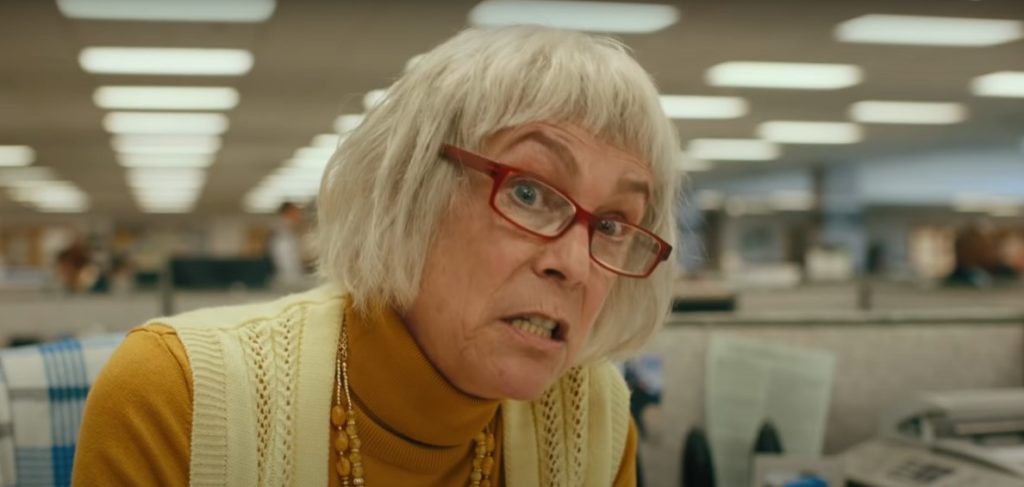
The person who’s controlling all of this is someone named Jobu, who happens to be none other than Joy, Evelyn’s daughter! Joy has come to this universe to destroy her mother, just as she has destroyed all her mothers across all the universes. Evelyn is now tasked with killing her own daughter or finding a way to save her while preventing Joy from killing her. She must achieve this while avoiding an all-knowing all-seeing Oz-like bagel (an “Everything” bagel), which has the power to destroy all versions of both Joy and Evelyn. Talk about a tall task!
Anybody who knows me knows I hate complex stuff. Incredibly complex rules. Complex plots. Complex character storylines. Complex mythologies. I hate it.
All that goes out the window with the Daniels.
I don’t know what it is these two do differently – although I suspect drugs are involved – but despite an overwhelming amount of complexity, their movie still works. And I’ve been thinking about that for the six hours since I saw the movie, trying to figure out why they’re able to pull this off where so many others fail at it.
I think I know the answer.
Their stories are always rooted in CHARACTER and EMOTION. And not passively. Emotion is the core of their films. Both this and Swiss Army Man are about people. In this case, it’s about a mother who doesn’t understand her daughter’s life choices. And it’s about that mother’s father who doesn’t understand his daughter’s life choices. And it’s about this woman checking out of her own marriage with this man who loves her.
Despite a fight that includes two men with butt plugs inserted in their butts, despite a subplot that involves a cook who secretly keeps a raccoon under his chef’s hat who helps him prepare his food, despite a major emotionally-intense scene taking place between two rocks with googly eyes that speak to each other in subtitles… this movie always comes back to the broken family and the attempt for them to reconnect and understand one another.
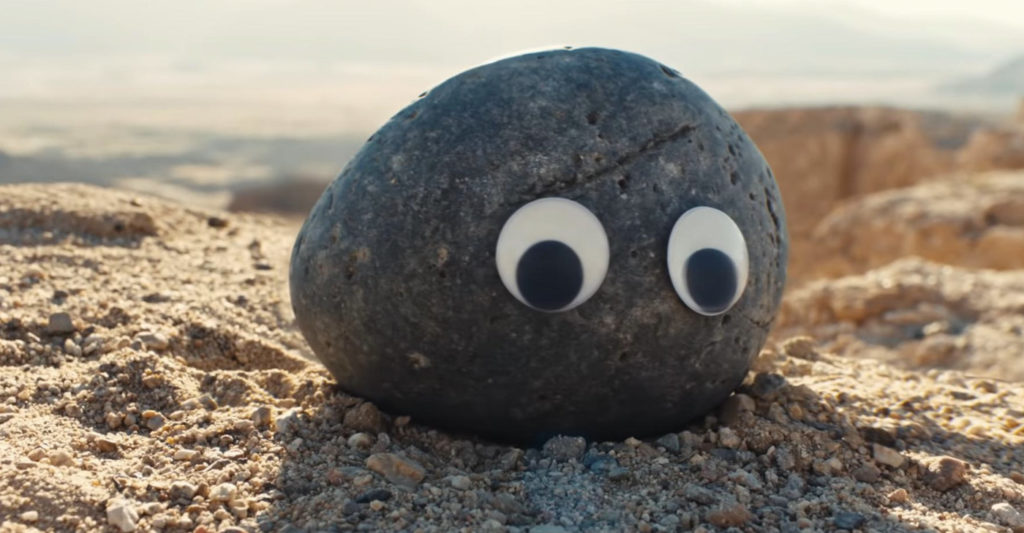
If there’s a lesson to take from this movie, take that lesson. Readers will let you go hog wild as long as you create characters we care about who have unresolved relationships with each other, that you then explore in an honest way (make their interactions feel like real life, not like soap operas). If you do that, you can get as crazy as you want, which this movie does.
Take the way you access your powers in this script. Remember, in the Matrix, you just dialed up your operator and asked him to upload a “helicopter pilot” program so you could fly a helicopter. Here, it’s way more involved. The way that the universes are connected is so complex that, to access them, you need to do very specific weird nonsensical things that the operator tells you to do, as randomness is the only way for the complex universes to connect to and access one another. So, for example, in one scene where Waymond needs fighting skills, he’s told he will have to give himself four paper cuts in between his fingers. Waymond then starts trying to paper cut himself before saying what we all know, which is that it’s impossible to give yourself a paper cut on purpose. It can only be done on accident. And yet, that is the only way he can access his multiverse doppelgänger’s powers, so he keeps trying until he gets it.
This weird and wacky way in which you access powers becomes a theme throughout the movie, as all the characters must do it. So all characters are constantly doing the weirdest things imaginable. Don’t get me started on the double butt-plug guard fight.

However, as weird as this was, the reason it worked is because the Daniels don’t treat it frivolously. They set the rules up but they play by them religiously. This is the difference between complex good and complex bad, is that with complex good, a lot of actual thought has been placed behind the choices, and then there’s a commitment to that choice for the entire movie. They don’t change the rules mid-stream just because it makes some other part of the plot easier to navigate.
This movie made me feel what it used to be like to go to the movies, where each experience when those lights went down meant you were going to see at least one thing you’ve never seen before. That was the magic of movies, that they could make you see and experience new things. Watch enough of them though, and you realize everybody just copies each other and, therefore, you never see anything new anymore.
Enter the Daniels and you don’t just see one new thing. You see dozens of new things. I mean, there is a love scene in this movie between Evelyn and Jamie Lee Curtis’s IRS character, where they’re in a relationship in another universe, and in this universe, everybody has hot dogs for fingers. Which means everyone has become really good with their feet, as feet have basically replaced hands. And the two are playing piano together, lovingly, with their feet, as their hot dog fingers drape across one another.

Where else are you ever going to see that?
To answer the original question, is this the best movie ever made? No. But it’ll probably be the best movie made in 2022. It is unique. It’s powerful. It’s thoughtful. It’s risky. I was talking with some people outside the theater afterwards and I asked this guy what he’d compare “Everything” to. He said that the first 60 minutes were like an indie version of The Matrix. But he said, after that, the movie is incomparable. You feel like you’re watching something that’s never been done before. I’d agree with that assessment. It’s just so its own thing. And I loved it.
[ ] What the hell did I just watch?
[ ] wasn’t for me
[ ] worth the price of admission
[x] impressive
[ ] genius
What I learned: As tempting to play with as plot and concept are, start from a place of “Who are these characters I’m following? What is it that’s broken within them that needs to be resolved? And what is it that’s broken in their relationships with others that needs to be resolved?” Really think hard about that and how you’re going to explore it in the movie. Because if you start with the plot and the concept and never really explore those three questions about your characters seriously, your script will always feel lifeless to some extent. If you’re not commenting on the human condition in some way… you’re not really writing a movie people will remember.
Is Leave The World Behind the next Get Out???
Genre: Slow Burn Thriller/Pre-Apocalyptic
Premise: A wealthy white liberal family renting an Air Bnb house in the country has their vacation rocked when a nationwide blackout occurs and an older black couple shows up at their door.
About: Leave the World Behind was a finalist in the 2020 National Book Awards. It quickly became a hot film package, with Sam Esmail (Mr. Robot) jumping in to direct and a cast that includes Julia Roberts, Ethan Hawke, and Mahershala Ali. This is a Netflix production and while Netflix is having their own ‘leave the world behind’ moment, which should affect future productions, I’m sure this one will remain on their slate.
Writer: Rumaan Alam
Details: 256 pages
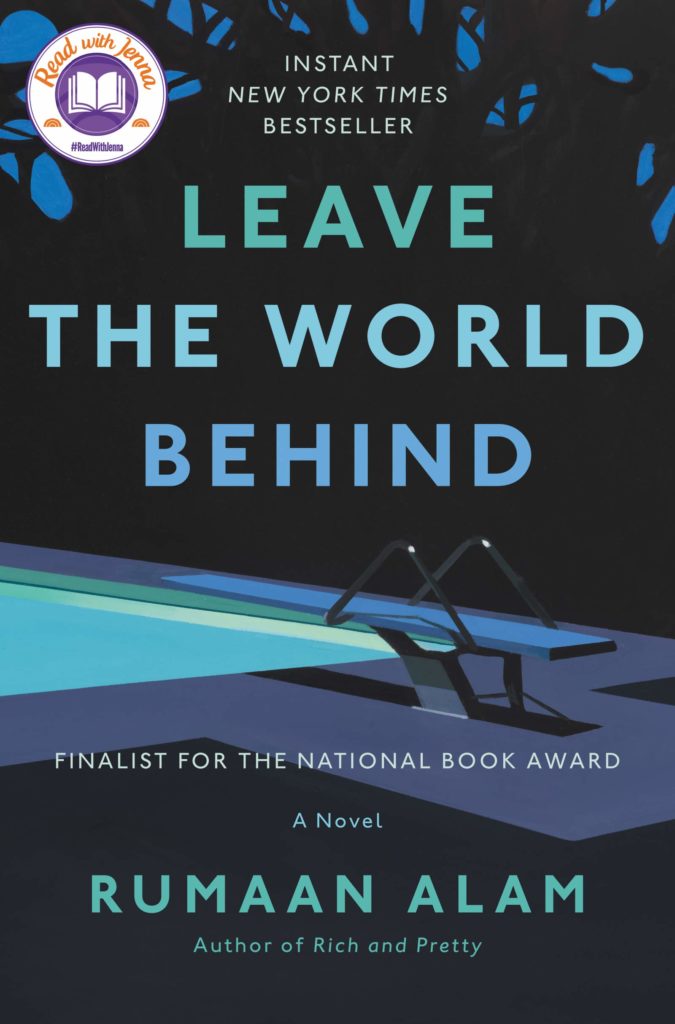
Was really excited to read this when I heard about it.
I’m always curious what Sam Esmail is working on and this sounded like a juicy-a$$ premise that’s right up my walkway.
Our story follows an upper middle-class Brooklyn family who’s spending a week’s vacation out in the middle of nowhere, a beautiful Air BnB home sitting amongst endless fields and forest. There’s Clay, the college professor father. Amanda, the mother with the cliched vague New York City job. And their kids, 15 year old Archie, and 12 year old Rose. From what we can tell, they are a very normal family.
Not long after they get to the house, there is news of a blackout on the East Coast, and then all phones and television go down. Nobody’s spooked yet but the first bit of fear creeps in when, later that night, an older black couple shows up at their door, George and Ruth. After some initial confusion, George and Ruth explain that they own this house and, while they live in the city, they turned back and came here when they learned of the blackout.
Clay wants to let them stay but Amanda is having none of it. She’s suspicious of the two immediately, even when it’s clear that they possess all the qualities of a cultured affluent couple. But with information on the blackout scarce and it seeming weird to kick two people out of their own house, they agree to let them stay downstairs for the night, until they figure out what’s going on tomorrow morning.
Except the next day only brings more confusion. A drive into town ends up in Clay getting lost. And then the first sign that something really bad is happening occurs – a long loud terrifying indescribable blast of noise. Everybody is legitimately freaked out at this point because nobody can begin to guess what the noise was.
As Clay huddles up with Amanda to figure out a plan, Archie grows sick, vomitting heavily. The group tries to decide if they should take him to the hospital (a full 45 minutes away) and while that decision is put on ice for a while, it accelerates the second Archie’s teeth fall out. It is then that both families learn that something is happening they’ve never seen before. And that the next 24 hours will be critical in figuring out – WHAT. DO. THEY. DO. NEXT?
So, to answer the question, “Is this the next Get Out?”, the answer is, sadly, no. And I say ‘sadly’ not because it tries to be and fails. But because it never tries at all. And, in my opinion, it should’ve been trying with all its might. Because when I left a comment on the Thursday post that I’d be reviewing this book, I’d just completed reading the hook of the story – a mysterious older black couple shows up on the steps of a liberal white family’s remote Air BnB.
It’s a delicious setup for so many reasons. First of all, you have this well-off white liberal New York family who claims to be the very essence of inclusive, yet from the moment the black couple show up, they’re suspicious of them, not entirely because they’re black, but at least partly so.
When it’s revealed that George and Ruth are the owners of the home, things get even more interesting. Think about how clever this setup is. You’ve rented a house – already given the owners their money. The end of the world may be happening. But then the owners show up. Whose house is it, at this moment? It’s a question on everyone’s mind but they’re all too polite to demand an answer. And since nothing drastic has happened yet, it’s a question they don’t have to deal with for the time being.
The promise of that question needing to be answered, though, is the very reason you keep reading. You just know these two families are going to go at it at some point.
Except that never happens.
If we were to measure the level of conflict between these two families over the course of the story (on a scale of 1 to 10) it never reaches above a 3. The families get along just fine, almost to an annoying degree. All I could think while I was reading this was, holy Moses did you miss out on a great opportunity.
Maybe the author didn’t want to go in the obvious direction of exploring a racially-charged conflict between a black and white family. But that doesn’t mean you should ignore any conflict between them whasotever! Conflict is drama. Drama is entertainment. Why would you actively avoid entertainment in a story?
Even the way that George and Ruth are introduced implies a story rife with mysteries and secrets about these two that will be revealed in time. Alas, there are no secrets. They’re just a normal wealthy couple who think and do normal things.
Once I realized that that wasn’t what the book was about, I was upset. But I eventually came around since I understood that this was more a meditation on family, specifically a well-off liberal white family, coming to the realization that all the things they held dearest and thought were important turned out to be useless when the shit hit the fan.
One of the featured chapters in Leave The World Behind has Clay driving into the nearby small town to see if he can gather information about what’s going on. Except all phones and GPS are down. So he quickly gets lost. All these country roads look exactly the same. Clay starts panicking, stopping his car at one point and internalizing that there’s a very real chance that he may never be able to ever find the house again.
This is when the book worked best, when it was dealing with our over-reliance on technology. Which made it all the more frustrating that it wasn’t able to find that same level of commentary when racial matters were involved. Amanda would occasionally think things such as, if George and Ruth were white, they never would’ve let them inside the house. But it was the guilt they felt at being perceived as racist that caused them to let the black couple in, a choice that had complicated an already complicated situation.
But these moments often lacked thematic continuity. In that aforementioned chapter of Clay driving around, his trip is punctuated by seeing a Mexican woman in a maid’s uniform flagging him down from the road. He stops for her and she starts crying to him, babbling in Spanish. Clay has had plenty of Mexican people clean his house and landscape his lawn. But he realizes he’s never actually talked to any of them and therefore has no way of understanding the woman, so he eventually just drives off.
I know there’s something being said here but what is it? White people pretend to care about minorities but when the shit hits the fan they don’t? Maybe it’s a commentary, specifically, on liberal hypocrisy? Except Clay never acts that way towards George, a man he quickly gains respect for. I don’t know. It was mushy.
Despite this, the script has a few plot beats that keep things fun. We get these big scary noises that rock everybody to their core, so we’re wondering what the hell those are. And the chapter that really got me was when Archie’s teeth fell out. I was putting myself in these parents’ shoes thinking, “What an absolute nightmare.” I mean, what do you do at that point? You’re in the middle of nowhere. You realize there are no doctors available to you. You have something happen to your child for which there is no reference point. That’s when I realized they were really screwed and I wanted to find out how this ended.
I’m not going to spoil the ending here but I will say it will be interesting to see if Sam Esmail keeps this ending or writes a new one. I suspect he’ll write something new. I just don’t think the current ending is the kind that will give a movie audience satisfaction.
But I do understand what Esmail saw in this. It’s a weird book and while it didn’t do what I thought it was going to do, the combination of it being thought-provoking and terrifying leads me to think it’ll work well as a movie. Especially with someone as talented as Esmail behind the camera.
[ ] What the hell did I just read?
[ ] wasn’t for me
[x] worth the read
[ ] impressive
[ ] genius
What I learned: Fear operates in the absence of information. The more information you give the reader, the less afraid they’ll be. It’s why a shark was so terrifying to a summer community in 1974 and it’s why these families’ situation is so terrifying in 2022. It’s risky, as a writer, to keep all the answers to yourself. But unless you have amazing answers that will shock an audience to its core, consider doing what Alam did, and keep everything close to the vest for as long as possible.

10 DAYS LEFT TO ENTER THE FIRST ACT CONTEST!
*******************************************************
What: The first act of your screenplay
Deadline: May 1st, 11:59 PM Pacific Time
Where: carsonreeves3@gmail.com
Include: title, genre, logline, any extra info you want me to know, a pdf of the act.
Cost: Free!
*******************************************************
Okay, on to more entries that failed to make the Anything Goes Amateur Showdown. The objective here is to take you behind the curtain so you can see what goes on in my head when I receive an entry. I’m hoping that by detailing the evaluation process, it will not only help the writers of these scripts improve their future loglines and queries, but help everyone here improve their loglines as well.
As always, if any of these scripts sound great, make sure to share that opinion in the comments. If something gets a ton of love, I’ll review it. Enjoy!
Title: Cheese Curls and Dirty Swimming Pools
Genre: Comedy
Logline: An elderly pool cleaner meets a naive young woman and introduces her to his world of psycho sexual deviancy and inadvertenly gets them entangled in a deadly mafia organization’s plot to assassinate a rival.
Why you should read: Anything goes? Well I think this definitley fits that description. A script 20 years in the making. Started off as a movie we actually made in high school and just kept rewriting. Funny. Dark. Strange. Twists and turns. Lets see if it all these years of working this thing can muster some laughs.
Why I didn’t pick it: This is an interesting one because the writer makes a good point. The showdown is called “Anything Goes.” That would imply that I want weird unique screenplays that take chances. Which is what Cheese Curls most definitely is. However, in doing this as long as I have, I’ve learned that while “kitchen sink” type loglines are fun, the number of writers who can actually deliver on the promise of that wackiness is miniscule. Whenever I pick one of these scripts up, they become incoherent within 20 pages. So I use the submission e-mail to decode whether this entry is an exception to the rule, or more proof of it. A few things stood out. “Inadvertenly” is spelled wrong. “Definitley” is spelled wrong. They’ve written “Lets” instead of “Let’s.” That’s three mistakes in less than a 100 word e-mail submission. That indicates a lack of attention to detail, which tells me I’m probably getting another incoherent kitchen sink mess. I also don’t like how the logline ends. A logline ending is important. Ideally, it’s the part of the logline that has the most punch. You want the reader leaving the logline thinking, “I have to read this!” Instead, the end of this logline is the least interesting part of the logline. 1) An elderly pool cleaner is a unique main character. 2) I like the contrast of a naive young woman entering into psycho sexual deviancy. 3) I’m not thrilled about the mafia element but, when combined with the other two elements, there’s potential there for an interesting clash. But then, out of nowhere, we’re assassinating some nameless generic rival. That sounds really boring and doesn’t connect to the rest of the logline in an interesting way. It absolutely destroys the logline and was the deciding factor for why I didn’t pick this.
Title: Meat is Murder
Genre: WWII / Sci-Fi-Action
Logline: The Nazis have created the Überhuman and are about to win WWII. David, a Jewish Wehrmacht soldier, who serves at the Eastern front under a false identity, must come to terms with his role as a Nazi-collaborator in order to prevent a global war of annihilation. “Django Unchained” meets “Valkyrie”.
Why you should read: What if Superman came down over the German Reich? –This script is set at the Eastern Front, told from the German perspective. The action set pieces are unique to the concept and backdrop and cannot be found in any other movie. It’s also a very weird script. In a way, I hope it’s weird enough to not be taken too seriously in the conventional sense, considering that the majority of the hideous atrocities of the Germans were committed in the East. I hope I have approached the subject matter with enough piety. Thanks in advance and kudos to everyone who participated.
Why I didn’t pick it: One of the harder loglines to write is the “mythology” logline. Science Fiction, Fantasy, Alternative Timelines, Long Ago Period Pieces. These loglines typically need you to set up the world before you tell us who the main character is, what his journey will be, and who stands in front of him. Which will often result in a two-sentence logline. Two-sentence loglines are doable. But they create challenges. You’re placing a period in the middle of a pitch that is supposed to flow from beginning to end. Because he’s dealing with the mythology issue, I don’t fault today’s writer for starting us off with, “The Nazis have created the Überhuman and are about to win WWII.” But when combined with the second sentence, there does seem to be a lack of enthusiasm to provide the reader with a clean effortless pitch. It’s clunky. And you don’t want your logline to be clunky. It implies to the reader that reading your script will also be clunky. Not to mention, the title doesn’t sound like it has anything to do with the story being pitched. That’s often a red flag. I might’ve tried to pull this logline off in one sentence: “A Jewish Wehrmacht soldier serving under a false identity must come to terms with his role as a Nazi-collaborator and prevent the German army from unleashing its newest weapon, the Überhuman.”
Title: Britt Johnson
Genre: Western
Logline: After Comanche raiders abduct his family, former slave Britt Johnson joins the Texas Rangers to bring them home.
Why You Should Read: This script was featured briefly in an Amateur Showdown on Scriptshadow. Since then, it has undergone numerous rewrites and the result is, I believe, an action-packed, gritty script that tells a story that few readers have seen or experienced before.
Why I didn’t pick it: I know. Confusing. This already made an Amateur Showdown once. So does that mean it’s an example of what’s good or what’s bad? The competition was stiffer this time around, which meant that each logline was put under more scrutiny. And this time, Britt didn’t make the cut. This logline shows you how even the simplest logline can be tricky to pull off. The first couple of times I read it, I thought the story was this: A guy’s family is abducted by Comanches. He’s able to get his family back, and now he’s going to “bring them home,” presumably traveling over a long distance where he and his family encounter many obstacles. But upon the third time reading it, I realized, “Oh, wait. He’s joining the Texas Rangers and they’re going to go to confront the Comanche, fight them, and get his family back.” The words “bring them home” did not convey that at all, which is why I was fooled. In my opinion, this is the most boring logline rendition possible for what sounds like a cool story. It’s your job as the writer to illicit that coolness in the logline. I would’ve gone with something like this… After Comanche raiders kill his son and abduct his wife and daughters, notorious former slave, Britt Johnson, joins the Texas Rangers to track down the Comanche and save his remaining family at all costs.
Title: PIZZA DELIVERY GUY
Genre: Contained action-thriller
Logline: When a suburban family home is invaded by a group of serial killers it seems certain that every captive will die horribly, but then the killers decide to order pizza…
Why you should read it: An actor who has starred in many action films read the script, really liked it, and wants to play the pizza delivery guy.Now the script is with two directors, who are currently deciding whether to become attached to the project.
Why I didn’t pick it: Our greatest strength as writers – that we live in our head – is also our biggest weakness. We often lack the ability to see our scripts, our pitches, our loglines, through the eyes of a reader who has no reference whatsoever for what we’ve put in front of them. As a result, we can’t identify what it is they may not get. “Pizza Delivery Guy” is labeled a “Contained Action-Thriller,” yet everything about the logline screams, “Goofy Comedy.” When I can’t match up the logline to the genre, I take the easy way out and move on to the next submission. In other words, if you’re going to pitch your story as an Action-Thriller, the logline should read like so. Also, this logline needs more information. “…but then the killers decide to order pizza…” can literally lead to 10 million different scenarios. The pizza guy shows up and… what? What does he do? This is, presumably, going to be 75% (or more) of your movie. You can’t leave that much of your movie unanswered in the logline. This is why writers need to get logline feedback. You’re shooting yourself in the foot.
Title: BREAKOUT
Genre: Thriller
Pages: 86
Logline: When a young woman is sealed inside her estranged Father’s property and outnumbered by intruders, she has no choice but to go deeper inside both the house and her past if she wants to get out alive.
Why You Should Read: This script was a semi-finalist in last year’s Final Draft Big Break contest. So per Carson earlier this week, is this a sign I should start looking for houses in the hills cause I’m about to hit it big?
Why I didn’t pick it: This script was one special attractor away from getting picked. What’s a “special attractor?” That’s the unique x-factor in your concept, the thing that separates it from everything else. It’s a family living silently in a world where monsters attack through sound. It’s a dinosaur theme park. It can even be a fairly new addition to popular culture, like the panic room was back in 2002, when David Fincher made the Jodie Foster contained thriller. Going “deeper inside a house” is just a fancy way of saying, “running around a house.” It doesn’t provide us with anything new or fresh in the genre. That’s not to say the script isn’t any good. You might have nailed the character development. But this is why flashy concepts are so valuable. They get more people wanting to read your script! The less flashy the concept is, the less people will want to take a look. It’s as simple as that. Either way I would encourage the writer, Kim, to get a logline consult if there’s more to this story, or get feedback from the community. Cause if the script is good enough to make the semi-finals of a contest, you need a logline that’s going to get more people to read it.
Title: In the Cold, Cold Night
Genre: Murder/Mystery/Whodunnit
Logline: With the world on the brink of a biblical apocalypse, a loose cannon alcoholic in a small Texas town tries to solve an old murder case to exonerate the primary suspect, her father, before the end of days.
Why you should read: It explores the hypocritical Texas towns I grew up in where religion is the only thing that matters and shitty people are considered saints just because they go to church on Sundays. This is a gold star example of writing what you know. It got an 8 on the Blacklist with a first draft in which the reader said “An impeccable sense of atmosphere and a compelling mystery put this script in good company with prestige shows like True Detective and Sharp Objects.”
Why I didn’t pick it: Getting an 8 on the Black List isn’t easy to do. And just from the way the writer communicates, I get the sense that this could be good. It’s been a while since I evaluated this entry, but I think the reason I passed was because the movie’s setup invites a great big, “So what?” to the primary objective of the story. Who cares if you exonerate your father if the world’s about to end anyway? It’s like me writing a movie called, “Go For The Gold,” about an aging runner who tries to win the Olympic 40 yard dash a day before aliens come and destroy the planet. Sure, he won the gold but… why did it matter exactly? I still think this script could be good but that’s why I chose not to feature it.
Title: The Boneyard
Genre: Thriller.
Logline: A purveyor of serial killer memorabilia must crack a case of missing murder victims to save his kidnapped daughter while hounded by the FBI as the main suspect.
Why You Should Read My Script: This is a gripping, edge-of-your seat thriller with a solid three-act structure, a twisty and complex plot moving the story along at a good pace, with a ticking clock, and life-and-death stakes from start to finish.
Why I didn’t pick it: This submission reads like it was constructed out of a bunch of buzzwords and buzz-phrases. “Serial killer memorabilia.” “Crack a case.” “Missing murder victims.” “Save his kidnapped daughter.” Even the WYSR sounds this way. “Edge-of-your-seat.” “Solid three-act structure.” “Complex plot.” “Ticking clock.” “Life-and-death stakes.” “From start to finish.” The title suffers the same fate (“The Boneyard”). Your script is not going to be celebrated for all the things that it does that are familiar. It’s going to be celebrated for all the things about it that are unique, that stand out. So if you don’t have anything unique to offer, your script is going to sound generic, which is how this sounds. When it comes to loglines, identify what it is that’s unique about your idea and BUILD THE LOGLINE AROUND THAT.
Title: Science vs Romance
Genre: Sci-Fi/Romance
Logline: When a burnt out screenwriter is hired to help fix the world’s first simulated reality program she inadvertently jeopardies existence by falling for the subject.
Why you should read: I’ve been writing scripts for a few years now but mostly thrillers, I thought for this contest I’d send the one script where I took a real chance and tried something really different (for better or worse).
Why I didn’t pick it: This logline fails for the simple reason that, after you read it, you’re not entirely sure what the author meant. A writer is hired to fix a simulated reality program. So far, so good. She then jeopardies (I’m assuming we meant jeopardizes) existence by falling for the subject. By “existence” are we talking about the simulated existence or actual existence? If I’m to take the logline literally, I’m assuming actual existence, although I don’t know how diddling around with a simulation program would affect reality. And this “subject.” What subject? What does that mean? One of the fake people inside the program? Or maybe the creator of the simulated reality? It’s anyone’s guess because it definitely isn’t clear. I don’t think you guys realize how common this is. I get submissions like this all the time where I don’t 100% understand the idea so it’s easy to say no. Get your loglines looked at ahead of time so you don’t make mistakes like this!
Title: BLACK MOLD
Genre: Sci-fi/Thriller (TV pilot)
Logline: A lonely Korean janitor exposed to an interdimensional spore that enables her to see aliens mimicking people must hunt for the key to prove her sanity and save the world from total hive-mind colonization.
Why you should pick: If titles like THEY LIVE and MIMIC make you salivate, but you’re looking for something more, imagine a world in which only a handful of people have discovered the majority of humans around them aren’t humans at all, but are masquerading aliens bent on enslaving the human race, but then imagine that all this is taking place in a version of reality that was split off from ours back in 1978, and there’s only one way to reset Reality itself back to what it was before the aliens arrived: by exploding a nuclear bomb outside of Las Vegas. Combining quantum physics, alien body-mapping tech, hallucinogenic digital mold, conspiracy theories and one cantankerous Korean lady with an axe to grind, Black Mold may just be your cup of miso soup.
Why I didn’t pick it – I went back and forth on this one. If it was a feature, I probably would’ve chosen it. As I like to remind everybody, pilots are eligible for Amateur Showdowns. But they have to be twice as good to get chosen. I will say that the more I read about this story (in the “Why you should pick” section), the more leery I became. The second you say that this secret alien race angle is spun off from a different timeline back in 1978, I immediately move this over into the “too complicated” folder. True, it’s different. But it doesn’t feel organic. It instead feels forced. Whenever I come across creative choices that feel forced, I always pull away. With that said, it’s a TV show. Which means you have more time to lay the foundation of the mythology before moving on to some of the wilder creative twists. So maybe this makes sense when it plays out over four seasons. But it’s a lot to take in in a single 150 word pitch. “Black Mold” is a good glimpse into how people assess ideas. You often go back and forth and back and forth on whether to choose something, and if there’s any hesitation at all – about a character, about the plot, about a creative choice – you use that as a reason to pass. Not because you’re an evil person who hates writers. But because you only have so much time in the day and there are many more scripts to get to.
Title: Empathy In An Uncanny Valley
Genre: (Sci-Fi, Drama, Thriller)
Logline: A robot detective that believes in God has sex and vapes seeks help with mental health issues from a police psychiatrist.
My Reason: I think you should read my script because of the logline! A religious robot that has sex and vapes; now that your mind is in the gutter — you know you wanna read it!
Why I didn’t pick it: I really wanted to pick this because the writer, who’s also a director, is starting to have some success and seems like a really cool dude. And the script sounds unique. But the logline isn’t giving me enough. Think of it from my perspective. I’ve just read this logline, right? What is the movie I’m imagining from it? A robot walking around vaping, sometimes having sex, and then having long drawn out therapy sessions with a therapist? Where’s the plot? Where’s the goal? Where is the bigger objective? One of the things I always say if you’re writing a small character-driven story where the focus is more on the internal than the external, is throw in a dead body somewhere. A murder. It gives your story instant pop and direction (someone’s going to have to investigate that murder – your protagonist could either be the investigator or the investigated), yet it still allows you to do all that character introspection that drew you to the idea in the first place. But if all you’re going to do is have a character walk around and do normal everyday things, most audiences are going to tell you that’s not enough.
Having concerns about your own logline? Let me help you with it. Logline consults are just $25 (and if you buy 4, you get a 5th for free). I also provide consultations for each stage of the screenplay journey: outline ($99), first 10 pages ($75), first act ($149), full pilot ($399), full screenplay ($499). I’ve read thousands of screenplays, including all the ones that get produced and all the ones that don’t. There’s no one better equipped to help you improve your script than me. If you’re interested in getting a consultation, e-mail me at carsonreeves1@gmail.com and let’s work together!
Genre: Drama
Premise: Two boys get shipwrecked on the remote Alaskan coast and must learn to survive on their own.
About: This script finished with 10 votes on last year’s Black List. The writer has no produced credits yet.
Writer: Paul Barry
Details: 102 pages
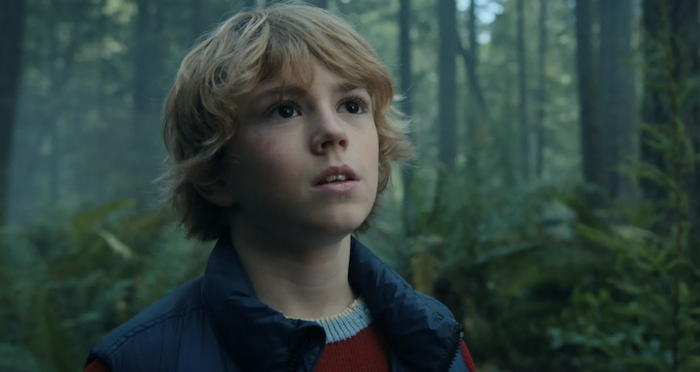 Adam Project’s Walker Scobell for Chris?
Adam Project’s Walker Scobell for Chris?
Generally speaking, if characters are stuck on an island alone, I’m all in.
There are so many possibilities to play with in the ‘stranded on an island’ sub-genre that you can’t really screw it up. Even without any bells and whistles, you’ve got the survival element, which we’ve learned is incredibly powerful, via Tom Hanks’ Castaway.
So I was looking forward to Skeleton Tree. Hopefully I won’t have to S.O.S. my way out of it.
It’s 2011 (I think) and 11 year old Chris, who’s obsessed with tsunamis, has just lost his father. A year after the funeral, he’s still trying to process the loss when his Uncle Jack calls and says he wants to take Chris on a boat trip with another boy down the coast of Alaska. Chris is thrilled and, after a contentious chat with his mother, off he goes.
After meeting up with Uncle Jack and getting on the boat, Chris meets 14 year old Frank, an angry kid who doesn’t talk much. While heading down the coast, they hit something, sink, and only Chris and Frank are able to get away on the lifeboat.
They wake up on a beach which gives way to an endless forest, which they start exploring. They find a “skeleton tree,” which is a tree with a bunch of coffins hanging from it, presumably from an old tribe that used to live here. They also find a cabin, which gives them shelter.
Their survival journey basically revolves around Frank getting mad at Chris all the time for no reason, and Chris befriending a crow who he names, “Thursday.” Not long after they arrive, Frank injures himself leaving him with a big gash that slowly puts him out of commission. If they’re to get out of here, it will be up to Chris. So off Chris goes to the top of a nearby mountain in the hopes of spotting nearby civilization.
One of the benefits of reading so many screenplays is that you identify patterns in the scripts that work and patterns in the ones that don’t, and you can identify these patterns fairly quickly.
Skeleton Tree starts out in Coastal Japan in 2011. Not because there’s a character we’re going to meet from Japan in 2011. Just to show the infamous 2011 Japan tsunami. Why are we showing a tsunami? Not because this movie has anything to do with tsunamis, or natural disasters for that matter. Because… well, we’ll have a few minor payoffs to the tsunami later in the story.
The very next scene offers us this slugline: INT. VANCOUVER CHURCH (FUNERAL) – DAY (FLASHBACK).
Flashback from when? 2011? When the tsunami happened? Or a flashback from the present day, 2022? We endure the boy’s father’s funeral in this scene then immediately jump to Vancouver Canada, “One Year Later,” in what we’re told is the “Present.” So I think that means it’s 2022, right? That the father died last year, and that our main character is obsessed with looking at old tsunami videos from 2011 for some reason? Or maybe it’s now 2012 and that’s what we’re treating as the “present,” even though it’s 10 years behind yours and my “present,” which I presume is right now.
Let me ask you a question. Weren’t there 10,000 easier ways to open this story? Why not just start in the present, see that our hero has a mother but no father, then reference the fact that his dad is dead via dialogue? Why do I have to do mental jumping jacks on top of tsunamis in order to figure out what year it is?
The counter-argument to this is, the writer is taking artistic liberties to open his script in an interesting visual way. Sure, the tsunami may not be that relevant to the story but it gives us some insight into what interests our main character, which means we’re learning about him. Also, seeing a kid at his father’s funeral is much more impactful than hearing about it. So that’s a fair argument as to why to show that. And movies jump between different years all the time. It may not be the easiest to follow on the page. But in a movie theater, we wouldn’t question these edits.
These are all fair arguments. I’m only telling you that when I see these things, and they’re not executed as clearly as they could be, it usually implies that more confusion is coming. Not always. But usually. Clarity is paramount to a screenplay. If that’s not there in the first few pages, it’s indicative of a larger problem.
On page six, Abby, the mother in the story, gets a call from her son’s uncle, Jack. Uncle Jack wants to take Chris, our hero, on an Alaskan boat trip. After she gets off the phone with Jack, she turns to Chris and says, that was your Uncle Jack. He wants to take you on a boat trip and you’re going to get to do all these things and it will be the adventure of a lifetime.
After Chris excitedly receives the news, the mom then, out of nowhere, says, I don’t think you should go. And she makes the case why she’s not ready to allow her son to go on this rip.
Much like the opening sequence, the scene develops clumsily. A mother excitedly tells her child about the adventure of a lifetime only to then tell him he can’t go. What happened here?
I suspect what happened is this: The writer needed to introduce a plot point – the Uncle wanting to take his nephew on this trip. So he had the Uncle call the mom, and the mom explain this plot information to the son. The writer also wanted the mom to not support this idea. Which is why she did a 180 in the time it takes to snap your fingers. The writer, in this instance, is thinking of the two things he needs to happen in order to make his story work AND NOT how this scenario would actually unfold in real life.
In real life, a parent wouldn’t say, “Guess what! Your grandpa wants to take you for ice cream.” “Yay! When can we leave??” “You can’t. I don’t want you going.”
A simple fix would have been to have the mother busy, the phone ring, the kid answer, the Uncle tell him about the trip, the kid tell his mom about the trip, and the mom say no. That’s a much more logical progression and you don’t have to have the weird moment where the mom switches from excited to resistant.
Obviously, you should write however you want to write. But, at some point, you need to read your script through the eyes of a reader. You need to see it through the lens of someone who doesn’t have all the extra information you have in your head. Is the sequence of events clear? Do the scenes pass the “I could see this happening in real life” test? If that critical eye never does a pass on your script, you’re sending something out that’s going to feel like the screenplay version of a Los Angeles side street – aka, riddled with speed bumps.
Wow, Carson. You just spent this entire review on the first six pages. But how was the actual script?? Well, I’m predisposed to liking any sort of “shipwrecked on an island” story, which is why I wanted to read the script in the first place. And there are a few cool elements spread about, such as the titular “skeleton tree.” There’s also a sort of Tom Sawyer/Huckleberry Finn adventure angle to the proceedings that, at times, was charming.
The problem was, the central relationship didn’t work for me. I could never figure out why Frank hated Chris other than the writer wanted him to. I could never get a feel for their dynamic and, as a result, I wasn’t as invested in their story as I wanted to be. On top of that, the plot needed more creativity. There didn’t seem to be a whole lot more planned than dropping these kids in a forest and seeing what happened. I would’ve liked more of a progression to the events that unfolded, to feel like we were moving towards something. There was nothing excessively egregious here but I actively kept thinking: WHEN IS SOMETHING GOING TO HAPPEN? There’s a gear or two missing from this story.
[ ] What the hell did I just read?
[x] wasn’t for me
[ ] worth the read
[ ] impressive
[ ] genius
What I learned: Unless you are directing your own screenplay or being paid to write a script by producers, be careful about opening your script with an overly cinematic sequence (i.e. something out of a Terrance Malick movie). While cinematic sequences (visual, kinetic, dissociative, voice-overs, plays with time in unique ways, jumps around a lot, montage-driven) can work amazing on-screen, they have far less impact on the page, and can often be confusing unless they’re impeccably described. I wouldn’t say that they’re impossible to pull off. But I see these attempts fail far more than I see them succeed. And if they’re confusing enough, you risk the reader closing your script before they’ve even gotten out of the first scene. The reader wants the read to be easy. They don’t want to have to do work. In fact, the second a script starts to feel like work, the reader is out.
What I learned 2: It’s often confusing for readers when scripts are set in the near past for no obvious reason. Like, if you wrote a script set in 2015, most readers are going to wonder why the script isn’t just set now, in 2022. I understand that there are remnants from the 2011 tsunami that wash up on the Alaskan shore during this script, which is why it’s not set in present day. But that isn’t immediately apparent in the story. And the tsunami has no obvious effect on the plot. I was just never convinced that this needed to be set in 2011. If you really wanted the tsunami stuff in there, you could’ve still had an old Japanese tsunami boat shipwreck, and made it 10 years old instead of 1 year.
Genre: Thriller
Premise: When a social media influencer meets a fan at a meet-and-greet, she’s so taken with her cleverness and vulnerability that she invites the fan to intern with her for the summer. At first, they’re an unstoppable team, but soon, the influencer is forced to wonder who she has let into her life.
About: This one finished on last year’s Black Last and is being produced by one of the hottest production companies in town, 21 Laps. The idea came to the writer, Michael Kujak, when he went to an influencer’s party, noticed a young teenager there, and found out she had won a contest to spend a day with the influencer but the influencer had ditched her. That sad little girl’s story stayed with him and eventually turned into the character of Millie in “Follow.”
Writer: Michael Kujak
Details: 109 pages
 Sydney Sweeney for Hannah?
Sydney Sweeney for Hannah?
I’m coming across more and more of these “influencer” and “Youtube personality” scripts. Since none of them have been made yet (and more importantly, none have become hit movies), the subject matter is still there for the taking.
My favorite of these is, without question, Birdies. I also loved last year’s influencer stalker script, Lurker. I’ve found that the key to this subject matter is authenticity. You need to know this world and speak its language to be convincing. Spread a fresh take and great execution on top of that and you’ve got yourself a screenplay.
If writers are looking for ways into influencer concepts, check out old high school movies and see if there’s an “influencer” version of that setup. For example, one of my favorite high school movies is Election, about this girl who’s determined to take down the principle, told through several different points of view. Try to imagine that movie but with influencers. Could be something there.
Today’s script, “Follow,” does an aged-up version of this, as the plot beats are very reminiscent to the 1992 thriller, Single White Female. Let’s see if it delivers enough to make me click and subscribe.
Hannah is a 23 year old influencer who’s built her Youtube channel up from a tiny little group of dedicated followers in high school, to a full-throttle influencing powerhouse of 1 million followers.
You wouldn’t know it by talking to Hannah, though, a perfectionist who’s only thinking about how she’s going to get to 2 million. You see, 2 million is where you start to get the big girl advertising sponsors: Make-up. Clothing.
But no matter what Hannah does, she can’t seem to improve her numbers. Her channel is stagnated. That is until she meets Minnie, a 15 year old nerdy high-schooler. After a local meet-and-greet, Minnie helps her out with a couple of things and Hannah offers her an internship.
Minnie is whip-smart and has watched every single one of Hannah’s videos multiple times, so she knows exactly what the viewers want and always figures out a way to get it to them. After Minnie helps Hannah prank infamous prank bro, Greyson Sinclair, her subscriber base shoots up. And when Hannah starts dating Greyson, her subs finally eclipse 2 million.
All of a sudden, Hannah is the hottest influencer on Youtube and there’s no question Minnie is her lucky rabbit’s foot. But when their next prank goes bad, resulting in a fellow influencer’s death, Hannah sees another side of Millie, a side that will stop at nothing to get her hero to the top. Will Hannah go along? Or will she give in to that nagging feeling that there’s something very off about Millie?
I think one of our jobs as screenwriters is to get out of our own way.
You get an idea for a movie. You start brainstorming how it’s going to play out. You do the necessary character work. You figure out the general plot. And you start writing.
But too many writers think of a script as this bible that needs to be Written with a capital “W.” Your prose needs to be poetic. Your description needs to be bathed in similes and metaphors. Every line of dialogue needs to be the perfect clever comeback.
The problem is, when you write this way, your script loses all connection to reality. It feels too slick, too manufactured, too artificial, too written.
The antithesis to all this is to get out of the way and let the story tell itself. If you’ve come up with a good concept and good characters, you shouldn’t need to overwrite. Just let the characters talk. Just let the story evolve.
That’s the sense I got from “Follow.” This isn’t like, “Birdies,” where the story is being told with this big flashy voice. It’s just a fun clean thriller where the writer makes his story the priority rather than himself.
When you do this right, people read your script and note how “effortless” the read was. That’s the first adjective that came to mind after finishing, “Follow.” It felt effortless.
I think one of the reasons for that was that you had two very driven characters at the center of the story. You had the lead character, Hannah, who’s determined to be a successful influencer at all costs. And then you had Millie, who probably wants Hannah’s success more than she does.
The more determined your character is, the more active they’ll be. The more active they are, the more they’re going to drive the story forward. And if you add a secondary main character to the mix who’s equally determined? It’s like having two engines in your car instead of one. You’re going to fly down that plot highway.
Speaking of plot, it’s important to note that goals in screenplays don’t always have to be physical. We’re used to these comic book movies where the goal is obtaining some Triglicerine Cube that can freeze time or whatever, and everyone is chasing after it. Physical story goals aren’t as common, though, when your characters are staying in one location, like a town or city.
For those situations, you’ll often use objectives. The “objective” that drives the majority of the plot in “Follow” is Vlog Con. Hannah needs to hit 2 million followers to be invited to the prestigious event that could save her channel. So that objective is what pushes us forward – Hannah and Millie try to get her to 2 million followers.
But the clear reason this script works is because it gets the main two characters right. No matter how many scripts I read, it always comes back to that. I was pulled in immediately by these two characters. They felt real to me. I loved how driven they were. They were both smart. I loved watching them come up with ways to get more subscribers.
And it is a bit strange because, normally, you’d want conflict in a team-up. But there isn’t much conflict between these two until the end. They’re a team. The conflict comes more from the other rival influencers, which I thought was a clever idea. Cause there has to be conflict coming from somewhere.
This is another example of a simple premise executed well. No bells and whistles. Just good old-fashioned strong storytelling.
[ ] What the hell did I just read?
[ ] wasn’t for me
[xx] worth the read
[ ] impressive
[ ] genius
What I learned: When you have a crazy character, make sure to root that character’s craziness in something real. If you make them crazy to be crazy, the character will come off as cliche and forgettable. Millie’s craziness is rooted in obsession that was built because, when she was younger and had no friends, Hannah’s videos saved her. Hannah became the best friend she needed and was there for Millie every day via a new video. No matter how crazy Millie gets in this movie, it’s always rooted in trying to help Hannah improve her channel. Even at the very end, when she’s doing the craziest stuff of all, she’s still trying to help Hannah (in her mind). That’s a great way to write ‘crazy.’

